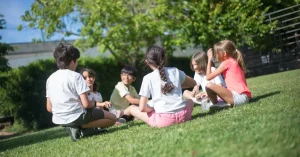In this blog, we discuss the statutory guidance on Relationships and Sex Education (RSE) and the requirements that all state-funded schools in Wales must meet.
What is Relationships and Sex Education (RSE)?
RSE stands for Relationships and Sex Education, which is a type of education that provides children and young people with age-appropriate information about relationships, sexuality, and sexual health. The main aim of RSE is to aid young people in developing the knowledge, skills and values they need to make informed, ethical decisions about their relationships and sexual health.

Relationships and Sex Education (RSE) in Schools
In schools, RSE covers a wide range of topics which includes:
- The physical and emotional changes that can occur to men, women and non-binary individuals during puberty
- Different types of relationships such as friendships, family relationships, romantic relationships
- Consent
- Healthy relationships
- Pregnancy and childbirth
- Sexual health including contraception, sexually transmitted infections (STIs) and HIV/AIDS
- Gender and sexual identity
- Online safety and sexting

LGBTQ+ Inclusion in Relationships and Sex Education
It is vital during RSE that the LGBTQ+ (Lesbian, Gay, Bisexual, Transgender, Queer/Questioning, and others) community is also included as well as discussions around LGBTQ+ identities and experiences in order to promote a better understanding, respect, and inclusivity among young people.
RSE should also cover:
- Different aspects of gender and sexual diversity
- Exploring how gender identity, gender expression, and biological sex all differ from each other
- Understanding the difference between sexual orientation and gender identity
- Accepting that LGBTQ+ individuals have the same rights to love, respect and dignity
- Exploring how homophobia, biphobia and transphobia have a negative impact of individuals and society
- Promoting understanding and respect for diversity
This inclusivity will allow young people to learn to be more accepting and respectful to individuals with different sexual orientations and gender identities and understand that everyone deserves equal rights and opportunities.

The Welsh Government Statutory Guidance on Relationships and Sex Education
In 2019, the Welsh Government published statutory guidance on Relationships and Sex Education in Schools (RSE). Within this guidance, the minimum requirements that all state-funded schools in Wales must meet have been laid out.
These requirements are:
- RSE must be taught in an age-appropriate, inclusive and comprehensive manner
- RSE should be an integral part of the school curriculum
- RSE should cover a wide range of topics including consent, sexual health, gender identity and healthy relationships
- RSE must be delivered in a way that is sensitive to the diverse experiences of learners through the use of inclusive language
- The goal of RSE is for learners to be provided with accurate information which will allow them to make informed choices throughout their lives
- During RSE schools should be prepared to discuss sensitive topics that may arise including STIs and sexual violence
- Schools should ensure parents and carers are aware of what is being taught during RSE and provide opportunities for feedback
- Additional support should be provided for learners who may require it, such as those who are LGBTQ+ or survivors of sexual violence or abuse

6 Tips for Educators to Teach RSE Effectively
There can be complexities when teaching RSE as it can be a sensitive topic. However, here are some tips to guide effective and responsible teaching.
Tip 1: Inclusivity
When teaching RSE it is vital that a safe and inclusive space is created for all learners, this includes using inclusive language.
Tip 2: Age-Appropriate Content
To engage learners RSE should be taught in a way that is relevant to the developmental stage of the students. This means you tailor the content, language and activities for the needs and interests of the learners.
Tip 3: Respectful and Non-judgemental Approach
When teaching RSE it is important that educators avoid moralistic or value-laden language that might make certain learners feel uncomfortable or excluded.
Tip 4: Open and Honest Communication
RSE should be taught to learners in an open manner providing them with the opportunities to ask questions in a safe, honest space.
Tip 5: Addressing Misconceptions and Stereotypes
During RSE educators should be prepared to address any misconceptions and stereotypes that learners may have. This may include challenging stereotypes and gender roles, addressing myths about sexual health, challenging learners on topics such as victim blaming and lad culture, and promoting positive attitudes towards diversity.
Tip 6: Supporting Learners
Schools and educators need to have additional support prepared to offer learners who may need it such as providing the details of support services or offering pastoral care.
Professional Learning Opportunities at Equal
At Equal Education Partners we are always looking to provide our staff with insight into the new curriculum. Our New Curriculum eLearning course breaks down the new curriculum into bite-sized, easy-to-digest pieces for all educators. This course is FREE for all Equal staff. Contact us today to find out how you can access the material.





